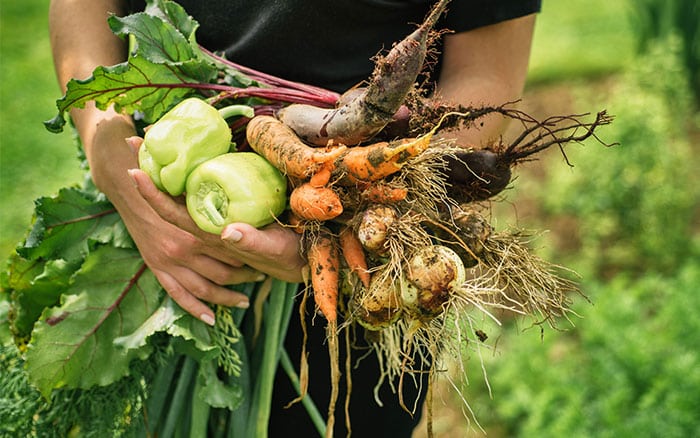As a new year settles, gardeners are taking stock of their space, or starting gardening as a beginner. January is a great time to turn over a new leaf. We can reassess and redefine what we want to achieve in the year ahead.
Why should you start gardening?
Gardening is good for you
It’s official, gardening is good for you. There are many ways that gardening can help our health. It boosts mental health by engaging us in activities where there are visible rewards and milestones.
Also, it encourages time outside with nature – proven to reduce stress – and provides a channel for social activity.
Additionally, it’s good for us physically too. Not only does gardening support an active lifestyle, it can grant us access to healthy homegrown produce.
There are a whole host of health benefits to be gained from falling headfirst into gardening this year.

Gardening is good for the planet
Giving back to Mother Nature, to your community, or your family home through gardening feels great. However, this extends to your local wildlife population too.
From the microbes in the soil to the bees and the birds, your garden plays a part in supporting the wider ecosystem. In addition, it’s gratifying to contribute towards something much bigger than you.
Gardening is sociable
Gardening can be a solitary pastime or a social one. So, it’s a great backdrop to spend quality time with loved ones. Set your little ones goals in the garden and it will spark their enthusiasm to get stuck in.
A joint task like this is also the perfect platform to open up communication as well. It’s why therapeutic horticulture is so effective and now prescribed on the NHS.

How to maintain your gardening resolution
According to research, you’re more likely to make a resolution stick if you make it a positive change. For example, make it “get out in the garden more” instead of “watch TV less.”
It’s also important to set yourself an achievable target. Try to take incremental steps towards a longer-term goal, rather than expecting to become an expert overnight. Take the time to learn the skills you need to succeed first. And, if in doubt, visit a local garden centre, gardening club, or fantastic garden to spark some inspiration.
Though there are upfront costs involved with starting, there are many ways you can save money and still get gardening. Get involved with a local or nationwide peer-to-peer lending site or app. These connect owners of tools with those in need of them.

Edinburgh even has a tool library where, instead of books, a library card will get members access to machinery and tools.
Once you’re up and running you may find yourself with a surplus. Swap your yields with a neighbour in need and get something you need in return. A bag of crumbly compost or more seeds perhaps?
Gardening ideas to get you started
Whether you’re an old hat at horticulture or as green as they come, here are some ideas to begin:

1 – Creative Composting
Most gardeners adept at grow-your-own are well-versed in the benefits of compost, but why not step up your game? Hot composters really speed the process and can boost turnover or try wormeries as a way to compost in compact spaces.
Also, stacking wormeries can produce liquid feed from your food waste, so there are lots of ways to keep composting at the top of your agenda. If you’re dipping your toe in for the first time, you can start quite small—with just a portable compost bin and garden waste.

2 – Wildlife works for you
Wildlife is a sure-fire way to get you fired up. On urban allotments, in particular, you’ll find habitats and wildlife corridors which are vital for supporting local wildlife. In turn, these go towards championing abundant growing conditions. This will help to show you gaps in your gardening gambit. For instance, if you know that hedgehogs are hanging around, you can bet they’re taking control of some of the slug and snail populations for you.
Equally, ladybirds inhabitants help with some aphid populations. Once you know what’s what, you can start to encourage the creatures required to eradicate pests. Pop in hedgehogs homes, superglue pinecones together for ladybirds, or add all singing all dancing bug hotels made from stacked pallets.

3 – Break new ground
The great thing about gardening is that you can set yourself aspirations appropriate for your experience level quite easily. And you never run out of new challenges to try when it comes to growing your own.
For the beginner, try your hand at ‘chitting’ potatoes. This is where you start tubers off inside so that they’re ready to plant out in March. Or start a herb garden for seasoning your home cooking. For more avid green fingers, sow chillies in seed trays, force rhubarb or why not plant some new varieties of bare-root fruit trees.

4 – Group gardening
There’s no better feeling than sharing your passion with loved ones. Planting a tree, such as apple, pear, or almond, is something that spans generations because they’re so long-living.
Plus, get your kids involved with the planting ceremony. This hands you an opportunity to spend time with them and open them up to the wonderful world of nature.
Whatever your motivation for more one-on-one time with mother nature, there’s nothing to lose and everything to gain. So, grab your spade and get stuck in.

Leave A Comment